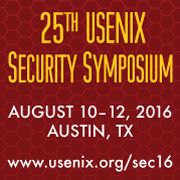
Get more
Help Promote graphics!
The Unfalsifiability of Security Claims
LISA: Where systems engineering and operations professionals share real-world knowledge about designing, building, and maintaining the critical systems of our interconnected world.
The LISA conference has long served as the annual vendor-neutral meeting place for the wider system administration community. The LISA14 program recognized the overlap and differences between traditional and modern IT operations and engineering, and developed a highly-curated program around 5 key topics: Systems Engineering, Security, Culture, DevOps, and Monitoring/Metrics. The program included 22 half- and full-day training sessions; 10 workshops; and a conference program consisting of 50 invited talks, panels, refereed paper presentations, and mini-tutorials.
Cormac Herley, Microsoft Research
There is an inherent asymmetry in computer security: things can be declared insecure by observation, but not the reverse. There is no test that allows us to declare an arbitrary system or technique secure. This implies that claims of necessary conditions for security are unfalsifiable. This in turn implies an asymmetry in self-correction: while the claim that countermeasures are sufficient can always be refuted, the claim that they are necessary cannot. Thus, we ratchet upward: there are many ways to argue countermeasures in, but no possible observation argues one out. Once we go wrong we stay wrong and errors accumulate. I show that attempts to evade this difficulty lead to dead-ends and then explore implications.
I argue that progress has been slow in security precisely because of a failure of self-correction. Bad ideas that are justified by contradiction-proof statements persist indefinitely and the resources they consume crowds out sensible measures to reduce harm. Examples abound. Many things that deliver no observed benefit are declared necessary for security, either because they have been defined to be so, or have been reached through logically muddled arguments.
Cormac’s main current interests are data analysis problems, authentication and techniques to combat fraud and abuse. He has published widely in signal and image processing, information theory, multimedia, networking and security. He is the inventor on over 70 US patents, and has shipped technologies used by hundreds of millions of users. His research has been widely covered in media outlets such as the Economist, NY Times, Washington Post, Wall St Journal, BBC, the Guardian, Wired and the Atlantic (but mostly just for writing down stuff that was incredibly obvious). He received the PhD degree from Columbia University, the MSEE from Georgia Tech, and the BE(Elect) from the National University of Ireland.
Open Access Media
USENIX is committed to Open Access to the research presented at our events. Papers and proceedings are freely available to everyone once the event begins. Any video, audio, and/or slides that are posted after the event are also free and open to everyone. Support USENIX and our commitment to Open Access.

author = {Cormac Herley},
title = {The Unfalsifiability of Security Claims},
year = {2016},
address = {Austin, TX},
publisher = {USENIX Association},
month = aug
}


















connect with us